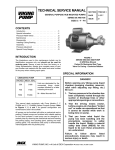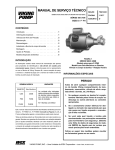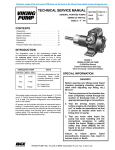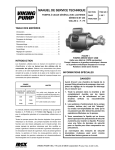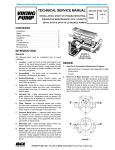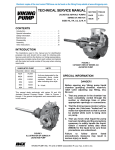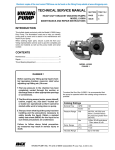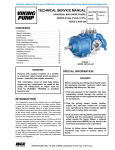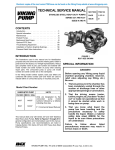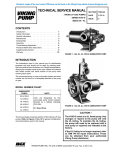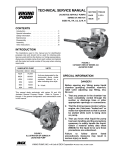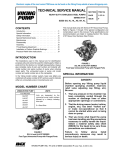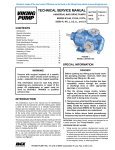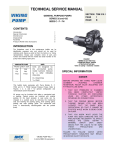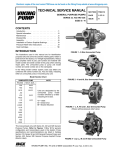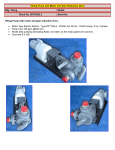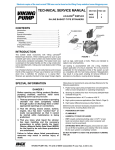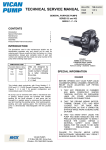Download TECHNICAL SERVICE MANUAL
Transcript
Electronic copies of the most current TSM issue can be found on the Viking Pump website at www.vikingpump.com TECHNICAL SERVICE MANUAL General Purpose hub mounted Pumps SERIES 56 AND 456 SIZES C - F - FH SECTION TSM 320.1 PAGE 1 of 7 ISSUE E CONTENTS Introduction . . . . . . . . . . . . . . . . . . . . . . . .1 Special Information . . . . . . . . . . . . . . . . . . . .1 Pressure Relief Valves . . . . . . . . . . . . . . . . . .2 Maintenance . . . . . . . . . . . . . . . . . . . . . . .2 Disassembly . . . . . . . . . . . . . . . . . . . . . . .2 Installing Casing Bushing . . . . . . . . . . . . . . . . 4 Assembly . . . . . . . . . . . . . . . . . . . . . . . . .4 Pressure Adjustment . . . . . . . . . . . . . . . . . . 5 Special Pump Designs . . . . . . . . . . . . . . . . . .5 INTRODUCTION The illustrations used in this maintenance bulletin are for identification purposes only and should not be used for ordering parts. Secure a parts list from the factory or a Viking representative. Always give complete name of part, part number and material with the model and serial number of the pump when ordering repair parts. figure 1 SERIES 56M and 456M Pump (3 GPM Size Shown) Packed Or Mechanical Seal Type. Valve On Casing - Clockwise Rotation SPECIAL INFORMATION UNMOUNTED PUMP UNITS PACKED MECH. SEAL C56 C456 F56 F456 FH56 FH456 DANGER ! Units are designated by the unmounted pump model numbers followed by a letter indicating drive style. Before opening any Viking pump liquid chamber (pumping chamber, reservoir, relief valve adjusting cap fitting, etc.) Be sure: M = Motor Mounted Unit 1. That any pressure in the chamber has been completely vented through the suction or discharge lines or other appropriate openings or connections. This manual deals exclusively with Pump Models C, F, FH56M and C, F, FH456M General Purpose Pumps. Refer to Figures 1, 2, 4, and 7 for general configuration and nomenclature used in this bulletin. All pumps can be furnished with either a mechanical seal or packing. Packed pumps are furnished with suitable packing for the liquid pumped. A seal pump can be changed to a packed pump by removing the mechanical seal and inserting the packing spring, inner packing gland, packing and outer packing gland. The mechanical seal pump is dimensionally interchangeable with the packed pump. 2.That the driving means (motor, turbine, engine, etc.) has been “locked out” or made non-operational so that it cannot be started while work is being done on pump. 3.That you know what liquid the pump has been handling and the precautions necessary to safely handle the liquid. Obtain a material safety data sheet (MSDS) for the liquid to be sure these precautions are understood. Failure to follow above listed precautionary measures may result in serious injury or death. VIKING PUMP, INC. • A Unit of IDEX Corporation • Cedar Falls, IA 50613 USA SAFETY INFORMATION AND INSTRUCTIONS IMPROPER INSTALLATION, OPERATION OR MAINTENANCE OF PUMP MAY CAUSE SERIOUS INJURY OR DEATH AND/OR RESULT IN DAMAGE TO PUMP AND/OR OTHER EQUIPMENT. VIKING’S WARRANTY DOES NOT COVER FAILURE DUE TO IMPROPER INSTALLATION, OPERATION OR MAINTENANCE. THIS INFORMATION MUST BE FULLY READ BEFORE BEGINNING INSTALLATION, OPERATION OR MAINTENANCE OF PUMP AND MUST BE KEPT WITH PUMP. PUMP MUST BE INSTALLED, OPERATED AND MAINTAINED ONLY BY SUITABLY TRAINED AND QUALIFIED PERSONS. THE FOLLOWING SAFETY INSTRUCTIONS MUST BE FOLLOWED AND ADHERED TO AT ALL TIMES. Symbol Legend : ! ! Danger - Failure to follow the indicated instruction may result in serious injury or death. BEFORE opening any liquid chamber (pumping chamber, reservoir, relief valve adjusting cap fitting, etc.) be sure that : ● Any pressure in the chamber has been completely vented through the suction or discharge lines or other appropriate openings or connections. ● The pump drive system means (motor, turbine, engine, etc.) has been “locked out” or otherwise been made non-operational so that it cannot be started while work is being done on the pump. WARNING WARNING ! WARNING ● You know what material the pump has been handling, have obtained a material safety data sheet (MSDS) for the material, and understand and follow all precautions appropriate for the safe handling of the material. ! ! ! ! WARNING ! WARNING BEFORE operating the pump, be sure all drive guards are in place. DO NOT operate pump if the suction or discharge piping is not connected. ! ! DO NOT place fingers into the pumping chamber or its connection ports or into any part of the drive train if there is any possibility of the pump shafts being rotated. DO NOT exceed the pumps rated pressure, speed, and temperature, or change the system/duty parameters from those the pump was originally supplied, without confirming its suitability for the new service. ! WARNING BEFORE operating the pump, be sure that: ● It is clean and free from debris ● all valves in the suction and discharge pipelines are fully opened. ● All piping connected to the pump is fully supported and correctly aligned with the pump. ● Pump rotation is correct for the desired direction of flow. ! WARNING SECTION TSM 320.1 ISSUE E PAGE 2 OF 7 Warning - In addition to possible serious injury or death, failure to follow the indicated instruction may cause damage to pump and/or other equipment. INSTALL pressure gauges/sensors next to the pump suction and discharge connections to monitor pressures. USE extreme caution when lifting the pump. Suitable lifting devices should be used when appropriate. Lifting eyes installed on the pump must be used only to lift the pump, not the pump with drive and/or base plate. If the pump is mounted on a base plate, the base plate must be used for all lifting purposes. If slings are used for lifting, they must be safely and securely attached. For weight of the pump alone (which does not include the drive and/or base plate) refer to the Viking Pump product catalog. DO NOT attempt to dismantle a pressure relief valve that has not had the spring pressure relieved or is mounted on a pump that is operating. AVOID contact with hot areas of the pump and/or drive. Certain operating conditions, temperature control devices (jackets, heat-tracing, etc.), improper installation, improper operation, and improper maintenance can all cause high temperatures on the pump and/or drive. THE PUMP must be provided with pressure protection. This may be provided through a relief valve mounted directly on the pump, an in-line pressure relief valve, a torque limiting device, or a rupture disk. If pump rotation may be reversed during operation, pressure protection must be provided on both sides of pump. Relief valve adjusting screw caps must always point towards suction side of the pump. If pump rotation is reversed, position of the relief valve must be changed. Pressure relief valves cannot be used to control pump flow or regulate discharge pressure. For additional information, refer to Viking Pump’s Technical Service Manual TSM 000 and Engineering Service Bulletin ESB-31. THE PUMP must be installed in a matter that allows safe access for routine maintenance and for inspection during operation to check for leakage and monitor pump operation. SPECIAL INFORMATION ROTATION: Viking pumps operate equally well in a clockwise or counterclockwise rotation. Shaft rotation determines which port is suction and which is discharge. Port in area where pumping elements (gear teeth) come out of mesh is suction port. PRESSURE RELIEF VALVES: 1. Viking pumps are positive displacement pumps and must be provided with some sort of pressure protection. This may be a relief valve mounted directly on the pump, an inline pressure relief valve, a torque limiting device or a rupture disk. 2. This series of pumps may be equipped with an integral pressure relief valve. Standard configuration is for clockwise rotation (suction on the right viewing the shaft end of the pump) but it also may be ordered for counter clockwise rotation. The valve cannot be reversed for opposite rotation. 5. CLEANING THE PUMP – It is good practice to keep the pump as clean as possible. This will facilitate inspection, adjustment and repair work. 6. STORAGE – If the pump is to be stored or not used for any appreciable length of time it should be drained and a light coat of lubricating and preservative oil should be applied to the internal parts SUGGESTED REPAIR TOOLS: The following tools must be available to properly repair Series 56 and 456 pumps. These tools are in addition to standard mechanics’ tools such as open end wrenches, pliers, screw drivers, etc. Most of the items can be obtained from an industrial supply house. 1. Soft Headed hammer 2. Allen wrenches (some mechanical seals and set collars) 3. Packing extractor, flexible 4. Mechanical seal installation sleeve 5. Brass bar 3. If pump rotation is reversed during operation, pressure protection must be provided on both sides of pump. 6. Arbor press 4. Relief valve adjusting screw cap must always point towards suction side of pump. DISASSEMBLY 5. Pressure relief valves should not be used to control pump flow or regulate discharge pressure. For additional information on pressure relief valves, Refer to Technical Service Manual TSM000 and Engineering Service Bulletin ESB-31. MAINTENANCE The Series 56 and 456 pumps are designed for long trouble free life under a wide variety of application conditions with minimum maintenance, however, the following should be considered. 1. LUBRICATION – External lubrication not required for this series of pumps. The liquid being pumped lubricates the internal bearings in the pump. 2. PACKING ADJUSTMENT – These pumps are designed with a packing spring to maintain a constant load on the packing; no external adjustment is possible. When leakage becomes excessive the packing must be replaced. Refer to ASSEMBLY, page 4 instruction for proper installation of packing. 3. END CLEARANCE ADJUSTMENT – After long term operation it is sometimes possible to improve the performance of the pump, without major repair, by adjusting the end clearance. Refer to ASSEMBLY, page 4 instructions for information regarding this procedure. 4. PRESSURE RELIEF VALVE – If your pump is equipped with a safety relief valve, adjustment can be made as follows. Remove the adjusting screw cap, turn in the adjusting screw to increase the pressure and turn-out to decrease the pressure. If the pump is not producing the rated capacity adjustment of the safety relief valve may be necessary. Be sure adjusting screw cap is re-installed before pump is started. DANGER ! Before opening any Viking pump liquid chamber (pumping chamber, reservoir, relief valve adjusting cap fitting, etc.) Be sure: 1. That any pressure in the chamber has been completely vented through the suction or discharge lines or other appropriate openings or connections. 2.That the driving means (motor, turbine, engine, etc.) has been “locked out” or made non-operational so that it cannot be started while work is being done on pump. 3.That you know what liquid the pump has been handling and the precautions necessary to safely handle the liquid. Obtain a material safety data sheet (MSDS) for the liquid to be sure these precautions are understood. Failure to follow above listed precautionary measures may result in serious injury or death. SECTION TSM 320.1 ISSUE E PAGE 3 OF 7 FIGURE 2 EXPLODED VIEW SERIES 56 AND 456 ITEM NAME OF PART 1 Electric Motor 2 3 ITEM NAME OF PART ITEM NAME OF PART 10 Inner Packing Gland (Series 56 only) 19 Rotor and Shaft Assembly Motor Shaft Pin 11 Packing Spring (Series 56 only) 20 Idler Coupling with Setscrew 12 Casing 21 Head Gasket 4 Mounting Bracket 13 Cap 22 Idler Pin 5 Capscrew for Bracket to Motor 14 Gasket for Cap 23 Head 6 Setscrew for Pump to Bracket 15 Adjusting Screw 24 Capscrew for Head 7 Packing Nut 16 Spring 25 Mechanical Seal (Series 456 only) 8 Outer Packing Gland (Series 56 only) 17 Poppet 9 Packing (Series 56 only) 18 Casing Bushing 1. Remove the capscrews and the head from the pump. It may be necessary to apply a slight pressure on the drive end of the rotor shaft to free the head from the casing. DO NOT PRY the head from the casing as this may damage and mar the gasket surfaces. 2. Remove idler from idler pin. If the idler pin is worn, both the head and idler pin, and idler should be replaced. 3. Next, completely remove the rotor and shaft from the casing by exerting pressure on the drive end of the shaft. 4. Remove the packing nut. 5. The pump is now ready for removal of packing or mechanical seal. Refer to Figure 3 or 4 for example. It is recommended a new mechanical seal or packing be used every time a pump is completely disassembled. PACKED (56) figure 3 All parts should be examined for wear before the pump is put together. When making major repairs, such as replacing a rotor and shaft, it is usually considered advisable to also install a new casing bushing. MECHANICAL SEAL (456) figure 4 SECTION TSM 320.1 ISSUE E PAGE 4 OF 7 SPRING WASHER ROTARY MEMBER PACKING NUT SPRING SEAL SEAT figure 5 RETAINER LUG CARBON WEAR RING INSTALLING CASING BUSHING ASSEMBLY The casing bushing can be replaced in the following manner: Insert a bar approximately 0.94” diameter and at least 3.5” long in the packing or seal end of the casing and press the bushing out of the casing. 1. Clean all parts thoroughly. When installing a new carbon graphite bushing, extreme care should be taken to prevent breakage as carbon graphite is a brittle material and easily cracked. When cracked the bushing may quickly disintegrate in operation. An arbor press should always be used and the bushing should be installed in one even uninterrupted stroke of the press. Dip the bushing in lube oil and start the bushing in the head end of the casing. Press until located to the “A” dimension in Figure 6. 2. Place the rotor and shaft in the casing. 3. Put the head gaskets on the head and the idler on the idler pin projecting from the head. Replace the head in the casing; tighten cap screws. NOTE: If a new casing bushing has been installed in the casing, use only one .002” head gasket on the head and tighten the capscrews evenly and securely. This will correctly position the bushing in the casing. Remove the head, add one .002” head gasket and replace the capscrews and tighten securely. NOTE: Turn the shaft by hand to be certain it turns freely. 4. When reassembling a mechanically sealed pump, place the spring washer and spring on the shaft, see Figure 5, Page 4. Coat the shaft and the inside of the rubber bellows of the seal rotary member with light oil. Slide the rotary member part way down the shaft. NOTE: The lapped face of the carbon wear ring must face toward the shaft end of the pump. Be sure the notches on the edge of the carbon wear ring mate with the retainer lugs in the rotary member. A Oil the lapped faces of the rotary member and the seal seat. Slide the seal seat on the shaft until it contacts the rotary member and then push the complete seal into the casing. Replace the packing nut and tighten. HEAD FACE figure 6 PUMP SIZE “A” DIMENSION C 0.88” to 0.94” F & FH 1.19” to 1.25” The end clearance within the pump is governed by the location of the casing bushing as well as the number of head gaskets. To correctly position the casing bushing in the casing, see note in step 3 of ASSEMBLY. Your pump is now completely assembled. Once again turn the pump shaft by hand to be sure it turns freely. Start the pump with a supply of liquid in the suction line, since the pump should not be run dry. 5. If the pump has packing rather than a mechanical seal, place the spring and inner packing gland on the shaft and slide into the pump. Next install the packing. Stagger the joints in the packing a half turn and add lube oil between each ring of packing. Push the outer packing gland in the casing, and replace the packing nut and tighten. SECTION TSM 320.1 ISSUE E PAGE 5 OF 7 DANGER ! Before starting pump, be sure all drive equipment guards are in place. Failure to properly mount guards may result in serious injury or death. IMPORTANT In ordering parts for the pressure relief valve, always give the model number and serial number of the pump as it appears on the nameplate and the name of the part wanted. When ordering springs, be sure to give the pressure setting desired. PRESSURE ADJUSTMENT DANGER ! Before opening any Viking pump liquid chamber (pumping chamber, reservoir, relief valve adjusting cap fitting, etc.) Be sure: 1. That any pressure in the chamber has been completely vented through the suction or discharge lines or other appropriate openings or connections. 2.That the driving means (motor, turbine, engine, etc.) has been “locked out” or made non-operational so that it cannot be started while work is being done on pump. 3.That you know what liquid the pump has been handling and the precautions necessary to safely handle the liquid. Obtain a material safety data sheet (MSDS) for the liquid to be sure these precautions are understood. Failure to follow above listed precautionary measures may result in serious injury or death. If a new spring is installed or if the pressure setting of the pressure relief valve is to be changed from that which the factory has set, the following instructions must be carefully followed. FIGURE 7 PRESSURE RELIEF VALVE - C, F, FH SIZE VALVE - LIST OF PARTS 1. Adjusting Screw Cap 2. Gasket for Cap 3. Adjusting Screw 4. Spring 5. Poppet 6. Casing PRESSURE RELIEF VALVE The relief valve is a pressure device to protect the pump and motor against excessive pressure. A pump without a properly set pressure relief valve operating against a closed discharge line could build up enough pressure to damage the pump or motor. The pressure setting is increased by turning the adjusting screw in and decreased by turning the adjusting screw out. 1. Carefully remove the valve cap, which covers the adjusting screw. Loosen the locknut, which locks the adjusting screw so pressure setting will not change during operation of the pump. 2. Install a pressure gauge in the discharge line for the actual adjustment operation. 3. Turn the adjusting screw in to increase pressure and out to decrease pressure. 4. With the discharge line closed at a point beyond the pressure gauge, the gauge will show the maximum pressure valve will allow while the pump is in operation. SECTION TSM 320.1 ISSUE E PAGE 6 OF 7 SPECIAL PUMP DESIGNS Pumps furnished with a PTFE Mechanical seal require a special rotor and shaft with drive pin installed for positive drive of the rotating member. All other assembly and disassembly instructions are the same. TECHNICAL SERVICE MANUAL General Purpose hub mounted Pumps SERIES 56 AND 456 SIZES C - F - FH SECTION TSM 320.1 PAGE 7 oF 7 ISSUE E WARRANTY Viking warrants all products manufactured by it to be free from defects in workmanship or material for a period of one (1) year from date of startup, provided that in no event shall this warranty extend more than eighteen (18) months from the date of shipment from Viking. The warranty period for Universal Seal series pumps ONLY (Universal Seal models listed below) is three (3) years from date of startup, provided that in no event shall this warranty extend more than forty-two (42) months from the date of shipment from Viking. UNDER NO CIRCUMSTANCES SHALL VIKING BE LIABLE UNDER THIS WARRANTY OR OTHERWISE FOR SPECIAL, INCIDENTAL, INDIRECT, CONSEQUENTIAL OR PUNITIVE DAMAGES OF ANY KIND, INCLUDING, BUT NOT LIMITED TO, LOST OR UNREALIZED SALES, REVENUES, PROFITS, INCOME, COST SAVINGS OR BUSINESS, LOST OR UNREALIZED CONTRACTS, LOSS OF GOODWILL, DAMAGE TO REPUTATION, LOSS OF PROPERTY, LOSS OF INFORMATION OR DATA, LOSS OF PRODUCTION, DOWNTIME, OR INCREASED COSTS, IN CONNECTION WITH ANY PRODUCT, EVEN IF VIKING HAS BEEN ADVISED OR PLACED ON NOTICE OF THE POSSIBILITY OF SUCH DAMAGES AND NOTWITHSTANDING THE FAILURE OF ANY ESSENTIAL PURPOSE OF ANY PRODUCT. THIS WARRANTY IS AND SHALL BE VIKING’S SOLE AND EXCLUSIVE WARRANTY AND SHALL BE IN LIEU OF ALL OTHER WARRANTIES, EXPRESS OR IMPLIED, INCLUDING, BUT NOT LIMITED TO, ALL WARRANTIES OF MERCHANTABILITY, FITNESS FOR A PARTICULAR PURPOSE AND NON-INFRINGEMENT ALL OF WHICH OTHER WARRANTIES ARE EXPRESSLY EXCLUDED. See complete warranty at www.vikingpump.com. VIKING PUMP, INC. • A Unit of IDEX Corporation • Cedar Falls, IA 50613 USA © 3/2013 Viking Pump Inc. All rights reserved







